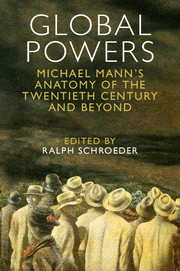Book contents
- Frontmatter
- Contents
- List of contributors
- 1 Introduction
- Part I Theory and history
- Part II Political, economic, military and ideological questions
- 5 On political decency
- 6 Mann on neoliberalism
- 7 Nationalism and military power in the twentieth century and beyond
- 8 History, historical sociology and the problem of ideology: the cases of communism and neoliberalism
- 9 Mann's globalizations and their limits
- Part III American exceptionalism
- Part IV Empire
- Part V Response
- Index
- References
6 - Mann on neoliberalism
from Part II - Political, economic, military and ideological questions
Published online by Cambridge University Press: 05 April 2016
- Frontmatter
- Contents
- List of contributors
- 1 Introduction
- Part I Theory and history
- Part II Political, economic, military and ideological questions
- 5 On political decency
- 6 Mann on neoliberalism
- 7 Nationalism and military power in the twentieth century and beyond
- 8 History, historical sociology and the problem of ideology: the cases of communism and neoliberalism
- 9 Mann's globalizations and their limits
- Part III American exceptionalism
- Part IV Empire
- Part V Response
- Index
- References
Summary
What is the value of global histories like this one? Most other academic disciplines, including the disciplines closest to sociology such as political science and history, have long abandoned the attempt to write encompassing histories of the world in favor of precise renderings of narrow events. Even most of sociology follows the advice to specialize. Given the explosion of data in our contemporary world, it seems hard enough to get even one small thing right – can anyone really get the history of the world right? Comparative historical sociology is perhaps the last holdout against academic specialization, the last space within academia where one can attempt projects of this nature, and it is good to ask ourselves periodically if the attempt is producing anything of value.
Michael Mann is one of the most talented practitioners of this kind of big think comparative historical sociology, so a close reading of his efforts should tell us something important about whether comparative historical sociology is itself worthwhile. I propose that for comparative historical sociology of this sort to be worthwhile, it should tell us more than we can learn from reading a series of separate in-depth examinations of particular episodes. It should allow us to reach new insight into historical events or identify important patterns that could not be seen by looking at a single event. As an example, Theda Skocpol's comparative analysis of revolutions demonstrated among many other things that close examination of single episodes is a method biased toward explanations that highlight agency, whereas comparative examination of multiple episodes can show that what seems like agency is in fact highly structured. Similarly, any good comparative analysis should be able to provide a different perspective than can be gleaned from reading a series of isolated in-depth studies of particular cases or events; if it does not, one would be well-advised to read a series of books by specialists instead, who will surely provide narratives with more nuance and attention to context.
This chapter therefore subjects parts of Mann's Volume 4 – specifically, his examination of neoliberalism and financialization – to this high bar: does his meta-analysis tell us something about these episodes that we could not have gleaned from the specialist literature? Does it cast the specialist literature in a new light, as Skocpol did?
- Type
- Chapter
- Information
- Global PowersMichael Mann's Anatomy of the Twentieth Century and Beyond, pp. 107 - 116Publisher: Cambridge University PressPrint publication year: 2016

